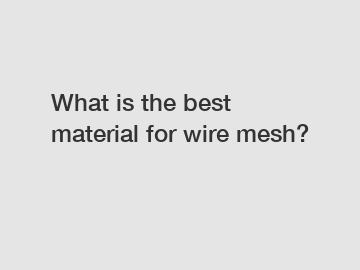What is the best material for wire mesh?
What is the best material for wire mesh?
Wire mesh is a versatile and widely used material that finds application in various industries including construction, agriculture, manufacturing, and landscaping. It is essentially a grid-like structure composed of intersecting wires, either woven or welded together, forming a series of uniform openings. Wire mesh is known for its strength, durability, and ability to allow air, light, and liquids to pass through while keeping out unwanted elements. When it comes to choosing the best material for wire mesh, several factors need to be taken into consideration. In this article, we will explore and compare different materials commonly used for wire mesh to help you make an informed decision for your specific application.
1. Stainless Steel Wire Mesh.

Stainless steel wire mesh is widely regarded as one of the best choices due to its excellent corrosion resistance, strength, and aesthetic appeal. It is available in various grades, such as 304, 316, and 316L, each offering different levels of corrosion resistance for specific environments. Stainless steel wire mesh is suitable for applications that require high durability and hygiene standards, such as food processing, chemical filtration, and architectural designs. Moreover, its non-reactive nature makes it suitable for use in corrosive environments.
2. Galvanized Wire Mesh.
Galvanized wire mesh is another popular choice due to its affordability and moderate corrosion resistance. It is made by coating regular carbon steel wires with a layer of zinc, which provides a protective barrier against rust and corrosion. Galvanized wire mesh is commonly used in applications such as poultry enclosures, fencing, and construction where corrosion resistance is needed but not as critical as in highly corrosive environments. However, it may not be suitable for use in applications where the mesh is constantly exposed to moisture or chemicals.
3. Aluminum Wire Mesh.
Aluminum wire mesh is known for its light weight, excellent corrosion resistance, and high conductivity. It is particularly suitable for applications where weight reduction is a priority, such as aerospace, automotive, and marine industries. Aluminum wire mesh is also widely used in architectural designs to create decorative elements and facades. However, it is worth noting that aluminum is not as strong as stainless steel or galvanized wire mesh, making it less suitable for applications that require high tensile strength.
4. Copper Wire Mesh.
Copper wire mesh is renowned for its unique aesthetic appeal and excellent conductivity. It is often used in artistic applications, such as sculptures, jewelry, and interior design elements. Copper wire mesh also offers antimicrobial properties, making it suitable for medical and laboratory environments where reducing the risk of bacterial growth is important. However, copper wire mesh is relatively expensive compared to other materials and may tarnish over time when exposed to certain environments.
In conclusion, the choice of the best material for wire mesh depends on the specific requirements of the application. Stainless steel wire mesh is commonly regarded as the best choice due to its corrosion resistance and strength, making it suitable for a wide range of applications. Galvanized wire mesh is a more affordable option with moderate corrosion resistance. Aluminum wire mesh is preferred when weight reduction is crucial, while copper wire mesh offers an aesthetic appeal and antimicrobial properties. By considering factors such as corrosion resistance, strength, cost, and application-specific requirements, you can make an informed decision for your wire mesh needs.
For more information or to discuss your wire mesh requirements, please contact us. Our experienced team will be happy to assist you in finding the best material and specifications for your specific application.
Are you interested in learning more about Installation process of fiberglass screens, Durable fiberglass screens, Advantages of security screens over other materials? Contact us today to secure an expert consultation!
244
0
0

Comments
All Comments (0)